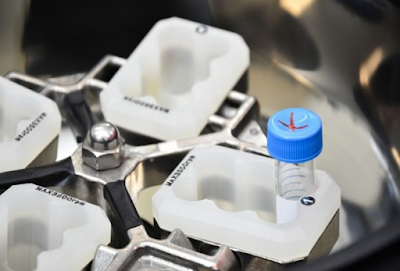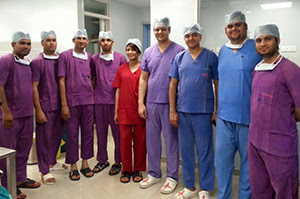Assisted reproduction depends largely on how the embryos are
developed and pre-selected to improve the chances of a successful IVF, and the
work of an embryologist revolves around the process. From the point of
collecting eggs to transferring embryos, the role of an embryologist is crucial
in the entire process of IVF.
Ensuring the
safety of patients’ fertility materials in the form of egg and sperms, and
helping patients improve their chance at pregnancy during an IVF cycle;
embryologists help childless parents procreate healthy babies. Surely for
couples longing for children, the embryologists act like a ray of hope, but how
do they make test tube miracles happen?
Critical role of an embryologist during an IVF cycle
The process of procreating a future baby in a lab sounds overwhelming but
frames the everyday job of an embryologist. In the IVF treatment, an
embryologist majorly takes over the process during the phase of egg retrieval.
Goral Gandhi, a
professional embryologist, who dedicates her time and efforts in helping
patients conceive says, “The ultimate objective of any ART procedure is the
birth of a healthy baby which can be achieved through an elective single embryo
transfer. Our roles require a great degree of precision and care when it comes to
patients’ precious genetic material in the form of eggs, sperms and embryos.
The process of embryo selection for the best possible IVF results is critical
to the role of an embryologist, as our decisions impact a patient’s success
with IVF.”
GoralGandhi has actively worked towards the science of ART and
IVF in India. Training more than 300 embryologists, she has educated doctors,
scientists and embryologists in various aspects of IVF, embryology, and
laboratory management. She also conducts ART workshops, including training in
IUI, IVF, ICSI, Vitrification, and Trouble Shooting in India, UAE, and Jordon.
Explaining the
process and the defined role embryologists play, Evelyn E. Neuber, Ph. DCLD
(ABB), Clinical Research Coordinator at the Center for Advanced Reproductive
Services at UCONN says “During egg retrieval, a doctor collects follicular
fluid containing an egg from a patient’s ovary and then hands it to the
embryologist who is responsible for isolating the egg from the liquid and
preparing it for insemination with the sperm; during embryo transfer, the
embryologist loads the embryo onto the catheter and hands it forward to do the
MD embryo transfer.”
That said, it can be concluded that the main part of professional baby-making,
which is embryonic development– from retrieval to maturation, lies under the
supervision and control of an embryologist. “Embryologists are fertility
experts with a wide-ranging role. We are also critical to a patient’s journey
towards parenthood although we work behind the scenes most of the time. For
example, we are responsible for fusing the sperm and egg extracted from the
patient, hoping that it will lead to successful embryo development. Once the
eggs are collected and the sperm is washed and prepared, the embryologist gets
to work,” explained Alberto Liñán Tegedor, Director of the IVF laboratory and
Embryologist at IVI Middle East Fertility Clinic in Oman.
Not only that, but they also perform extended roles by emotionally and
medically supporting their patients and offering them the leverage to plan
parenthood whenever they want through the process of embryo verification.
Thus, embryologists play a key role in delivering happiness to parents through
successful pregnancies. It is, however, majorly a result of successful
scientific advances and awareness around the help available for couples dealing
with infertility that embryologists today see and perform miracles in the form
of healthy test-tube babies.






Considering the complex nature of IVF success, there are various myths revolving around it and here we are busting the commonest of them. Go through them and clear your doubts.
ReplyDelete